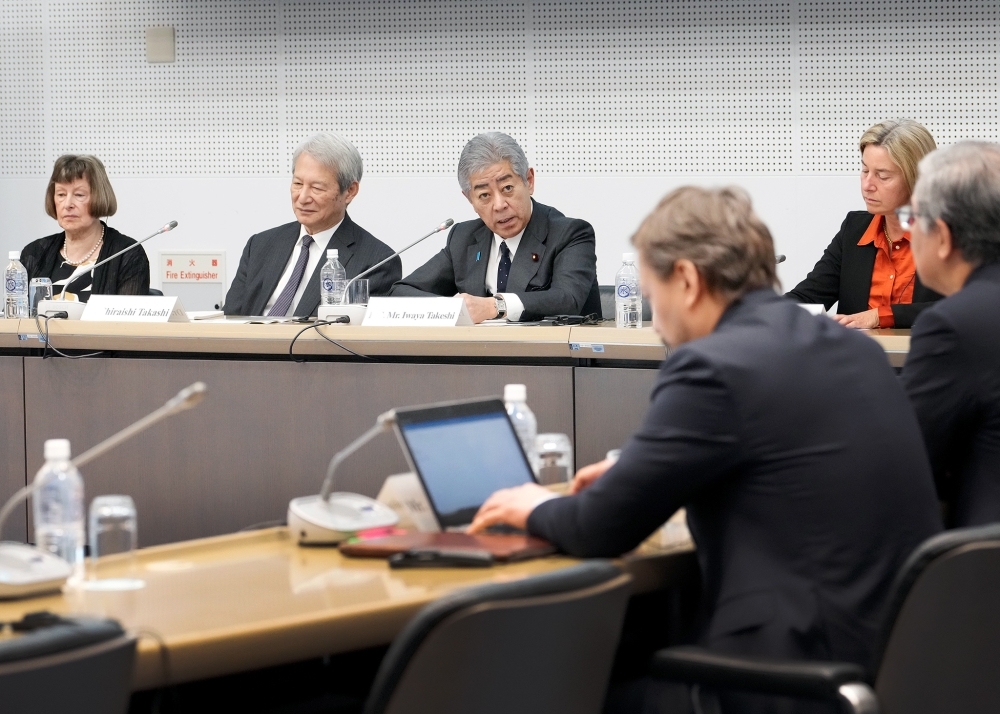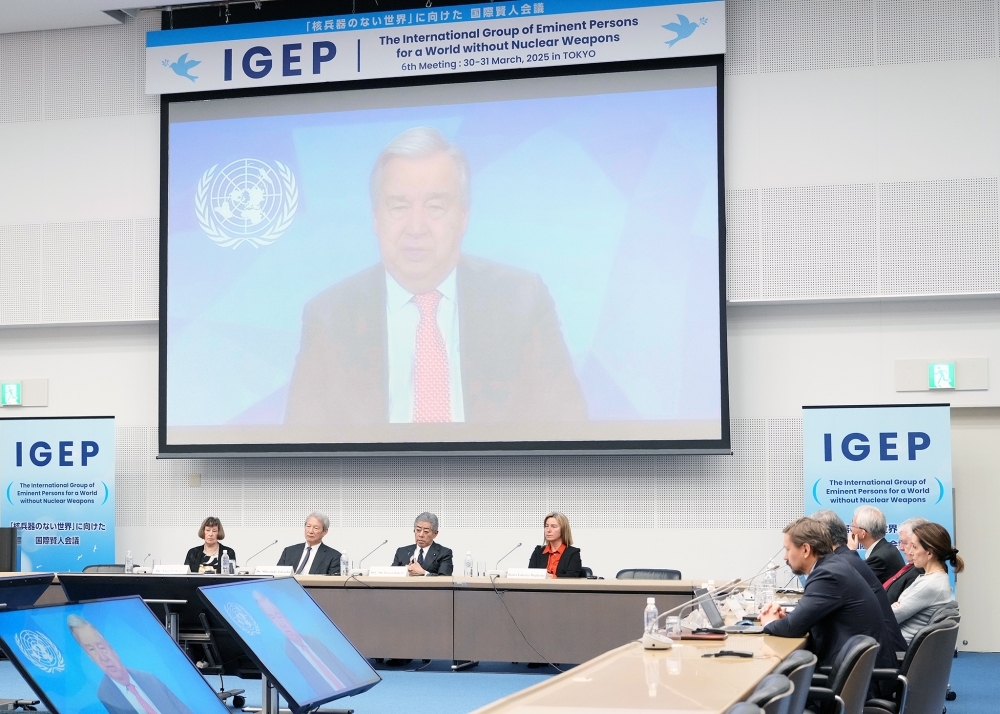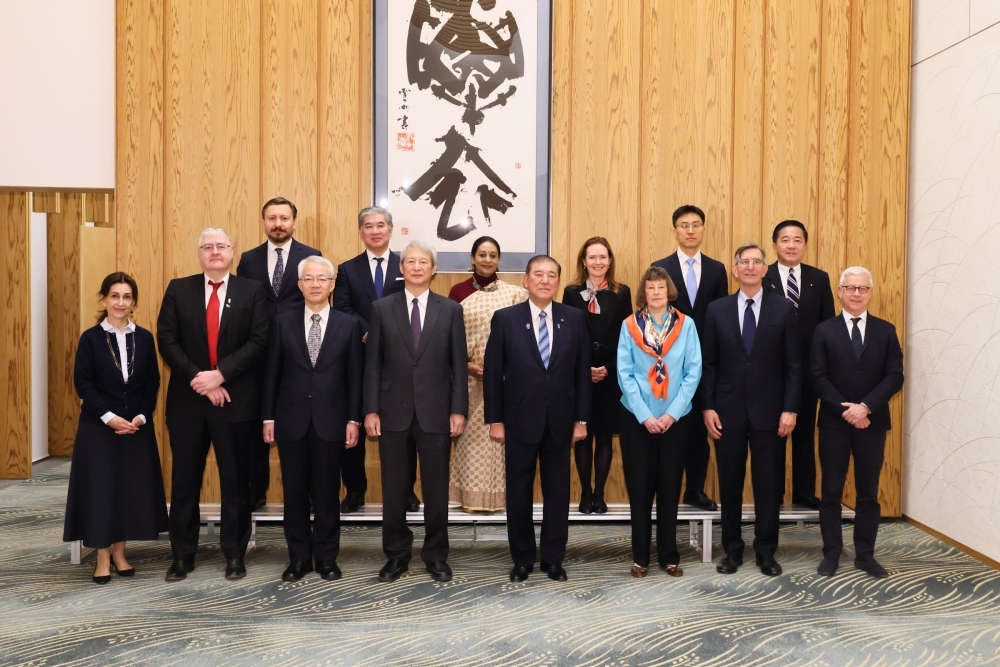Press Releases
The Sixth Meeting of the International Group of Eminent Persons for a World Without Nuclear Weapons
 Foreign Minister IWAYA at the Opening Session
Foreign Minister IWAYA at the Opening Session
 Opening Session
Opening Session
 Courtesy call on Prime Minister ISHIBA
(Photo: Cabinet Public Affairs Office)
Courtesy call on Prime Minister ISHIBA
(Photo: Cabinet Public Affairs Office)
On March 30 and 31, the sixth and final, meeting of the International Group of Eminent Persons for a World Without Nuclear Weapons (IGEP) was held at the United Nations University in Shibuya, Tokyo. The meeting was attended by fourteen members: Dr. SHIRAISHI Takashi, Chair of the IGEP and Special Professor Emeritus of the Prefectural University of Kumamoto, three Japanese members, and eleven international members including from nuclear-weapon and non-nuclear-weapon States (two members participated partially online). Furthermore, Honourable Federica Mogherini, the Rector of the College of Europe (former High Representative of the European Union for Foreign Affairs and Security Policy and Vice-President of the European Commission), participated as a political leader, engaging in candid and open discussions. Additionally, on March 30, Mr. IWAYA Takeshi, Minister for Foreign Affairs of Japan, attended the opening session and gave welcome remarks on behalf of the Government of Japan.
- At the opening session in the morning of March 30, Foreign Minister Iwaya delivered a welcome address, stating that there is absolutely no wavering in Japan's stance of making steady progress towards the ideal of a world without nuclear weapons and the Government of Japan intends to take seriously the recommendations compiled at the 6th meeting of the IGEP and continues to work on realistic and practical efforts towards a world without nuclear weapons. Following this, Honourable Mogherini delivered remarks as a political leader, and video messages from H.E. Mr. António Guterres, Secretary-General of the United Nations, H.E. Ms. Michelle Bachelet, former President of the Republic of Chile, H.E. Dr. Hans Blix, former Director General of the International Atomic Energy Agency, and Ambassador Amina Mohamed, former Cabinet Secretary for Foreign Affairs of the Republic of Kenya were presented. The Chair delivered opening remarks as well.
- Over the course of two days, March 30 and 31, the members engaged in six sessions, having final discussions on concrete measures to achieve a world without nuclear weapons based on the deliberations accumulated in previous meetings. Based on these discussions, they issued recommendations for the 2026 NPT Review Conference. The government of Japan intends to further advance realistic and practical efforts toward achieving a world without nuclear weapons, taking the recommendations into consideration in preparation for the 2026 NPT Review Conference. The recommendations will also be shared with the international community using the opportunities provided by the third session of the Preparatory Committee for the 2026 NPT Review Conference from April 28.
- Participants attended a lunch hosted by Mr. NAGASHIMA Akihisa, Special Advisor to the Prime Minister, on March 30. On March 31, the members paid a courtesy call on Mr. ISHIBA Shigeru, Prime Minister of Japan, and exchanged views with the parliamentary leagues on disarmament. In the evening on March 31, they attended a dinner hosted by Ms. ERI Alfiya, Parliamentary Vice-Minister for Foreign Affairs, and had discussions in a cordial atmosphere.
(Reference2)
Video Messages from Political Leaders
- H.E. Mr. António Guterres, Secretary-General of the United Nations (YouTube)

- H.E. Ms. Michelle Bachelet, former President of the Republic of Chile (YouTube)

- H.E. Dr. Hans Blix, former Director General of the International Atomic Energy Agency (YouTube)

- H.E. Dr. Amina Mohamed, former Cabinet Secretary for Foreign Affairs of the Republic of Kenya (YouTube)

(Reference3)
Recommendations by the IGEP (PDF)
[Summary]
Based on the discussions accumulated over the six meetings of the IGEP, the recommendations for the 2026 NPT Review Conference emphasize five core principles: (1) Comply with the UN Charter in its entirety, including by not committing acts of aggression and by renouncing the use of force for the acquisition of territory, (2) Comply with applicable international law including international humanitarian law, (3) Responsibility to work for a world without nuclear weapons (the biggest responsibility to lead are the states that possess nuclear weapons), (4) Foster a culture of dialogue and cooperation to uphold and reinforce the multilateral non-proliferation regime with the NPT at its centre, and work together to ensure that it is agile in responding to emerging challenges and opportunities, including those related to technology, and (5) Keep working to move away from dependence on nuclear weapons (Nuclear deterrence has not proven to be, nor should it be, the final form of security). The recommendations call for urgent steps to prevent nuclear war, stop nuclear arms racing and reduce proliferation risks, and work for a constructive 2026 NPT Review Conference.
(Reference4) International Group of Eminent Persons for a World without Nuclear Weapons (IGEP)
- Background and Objectives The IGEP was established in which participants from both nuclear-weapon States and non-nuclear-weapon States, as well as those from countries participating and not participating in the Treaty on the Prohibition of Nuclear Weapons, to exchange ideas and thoughts beyond their respective national positions and engage in candid discussions concerning a concrete path towards the realization of a world without nuclear weapons. Since the first meeting in December 2022, six meetings have been organized including this meeting.
- 15 Members of the IGEP
[In-person participation]
- Shiraishi Takashi (Chair)
- Special Professor Emeritus, Prefectural University of Kumamoto
- Angela Kane
- Former Under-Secretary-General and High Representative for Disarmament Affair of the United Nations
- Takamizawa Nobushige
- Visiting Professor, Graduate School of Public Policy, the University of Tokyo
- George Perkovich
- Japan Chair for a World Without Nuclear Weapons Senior Fellow, Nuclear Policy Program Carnegie Endowment for International Peace
- Ian Anthony
- Scientist, Department of Defence Analysis, Security Policy Section, Swedish Defence Research Agency (FOI)
- Bruno Tertrais
- Deputy Director, Foundation for Strategic Research
- Dina Kawar
- Ambassador of the Hashemite Kingdom of Jordan to the United States
- Manpreet Sethi
- Distinguished Fellow, Centre for Air Power Studies (CAPS)
- Akiyama Nobumasa
- Professor, School of International and Public Policy, Hitotsubashi University/Director of Center for Disarmament, Science and Technology, the Japan Institute of International Affairs (JIIA)
- Tanya Ogilvie-White
- Senior Research Adviser, Asia-Pacific Leadership Network for Nuclear Non-proliferation and Disarmament (APLN)
- Anton Khlopkov
- Director of Center for Energy and Security Studies (CENESS)
- Tong Zhao
- Senior Fellow, Carnegie Endowment for International Peace
[Virtual participation]
- Rose Gottemoeller
- Former U.S. Under Secretary of State for Arms Control and International Security Affairs
- Gustavo Zlauvinen
- President of the 10th NPT Review Conferen
[Absence]
- Raden Mohammad Marty Muliana Natalegawa
- Former Minister for Foreign Affairs of Indonesia

